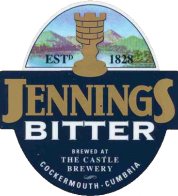 |
 |
|

|
|

|
 |
home
about
Protz
features
A-Z
books
|
|
Protz:
features
reviews
tastings
news & events
books
|

| |
in praise of regionality
by Willard Clarke, 07/05
Is the British brewing industry on the verge of yet another major upheaval? Wolverhampton & Dudley has paid �46m for Jennings in Cumbria, and now there is a Chinese whisper doing the rounds that Greene King may be preparing a bid for
Belhaven, the Scottish independent. Belhaven's chief executive Stuart Ross said the story was "pure speculation". But that is par for the course when rumours swirl around a brewery. When successful breweries the size of Belhaven and Jennings become the subject of takeover talk, they will be bought sooner or later.

|
|
The two companies are particularly attractive to cash-rich super-regionals such as Greene King and W&D.; Jennings owns a tempting 130 pubs in an area with a large tourist industry.
Belhaven is in a pleasant part of Scotland, on the coast between the English border and Edinburgh. Unusually for an independent in Scotland, where there is little formal tied trade, Belhaven owns 40 pubs and supplies 2,500 free trade accounts. |
|

|
The emergence of the four global brewers based in Britain - S&N;, Interbrew, Coors and Carlsberg - has left a vacuum. The big four not only dominate this country but also have vast overseas business. Interbrew is the world's biggest brewer while S&N; owns Kronenbourg in France and substantial interests in Russia. Carlsberg, which has dropped Tetley from its title, has always been a global player, while Coors, one of the American super-giants, is still tentatively working out how the British brewing industry and pub trade work.
These interests make the Big Four substantially different to the Big Six that used to dominate Britain but which disappeared as a result of the Beer Orders in the 1990s. The Big Six were British based and had little overseas sales. The Big Four, on the other, have massive international interests and this gives scope for companies the size of Greene King and W&D.;
| Their aim is to penetrate the whole of the British market. They have strong brands and a distinctively different image to the globals. Both focus on cask ales, a sector largely ignored by the giants, whose aim is to saturate
the market with lager and keg brands. Greene King and W&D;, on the other hand, can offer more discriminating drinkers the current Champion Bitter of Britain - Greene King IPA -
Abbot Ale, the enormously successful Old Speckled Hen, one of the leading premium ales, Pedigree, and Banks's Bitter. |
|
 
|
They are restless companies. They want to grow, expand and control more pubs in which to sell their beers. But they have problems of capacity. W&D; is working close to full volume at both Wolverhampton and Marston's
in Burton-on-Trent. It says Jennings will jigsaw into its business plans - but for how long? The Cumbrian brewery is on a cramped site in a remote part of the country. A leading industry insider told me last that he wouldn't give Jennings more than two years before W&D; closes it.
I have also been told on excellent authority that W&D; approached an independent brewer in the South-east with a view to a merger. The brewery in question has spare capacity and is well placed for the motorway network. That offer was summarily rejected but I understand W&D; is now stalking another possible contender in the Home Counties.
Greene King in Bury St Edmunds, Suffolk, is not best placed for selling beer nationally. Belhaven would be a good base for distributing to Scotland and the north of England, though I wouldn't dismiss the possibility of the company looking at bigger sites in North-west England with both spare capacity and good road links.
Both companies will make reassuring noises about maintaining the brands of breweries they buy. But experience and history prove that big breweries tend to impose their beers on smaller ones. It would clearly be madness for an English brewer to phase out Scottish beers, but the portfolio could be pruned to make way for IPA and Abbot.
We need choice. Choice stems from a diversity of breweries. Greene King and W&D; need to be told in no uncertain terms to stay at home and let smaller companies remain in business for all our sakes, on both sides of the bar.
|
|
home
about
Protz
features
A-Z
books
|